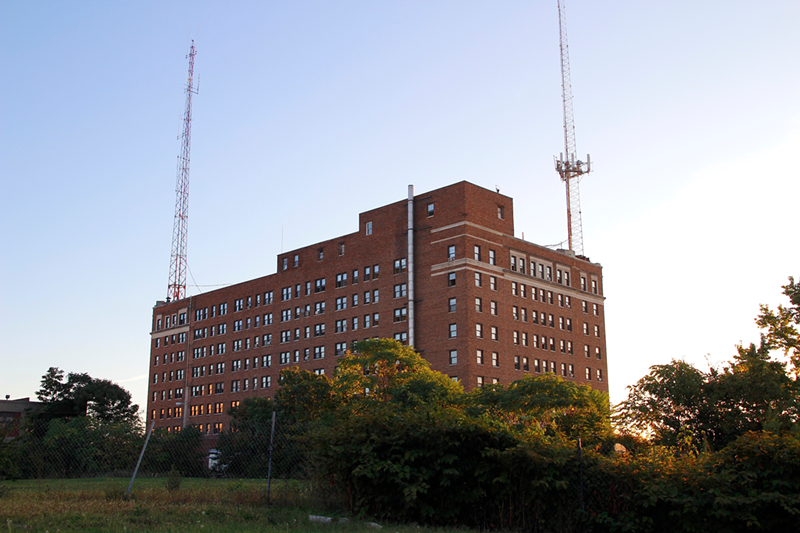More than 100 residents living in affordable housing at the Alms in Walnut Hills will get to stay in their homes for now. A federal judge yesterday granted a preliminary injunction that keeps the Department of Housing and Urban Development from pulling out of the building.
U.S. District Court Judge Timothy Black’s ruling doesn’t end the case, but keeps HUD from immediately ending its subsidies — and with them, residents’ leases — until the lawsuit is settled.
That decision is the latest in a long battle to shore up conditions at the former luxury hotel and several other buildings, which a state court placed in receivership with Indianapolis-based developer Milhaus after city inspections found terrible conditions in the properties under New Jersey-based owners PF Holdings. Despite the receivership, HUD moved in July to pull its Housing Assistance Payments, or HAP contract, from the building after it failed several HUD inspections.
RELATED: What Went Wrong at the Alms?
The building failed two inspections following Milhaus’ receivership, oddly receiving lower scores than when PF Holdings was in control of the building. Most of those failing scores come from vacant units or areas of the building that don’t pose a threat to residents, however, documents related to the case suggest.
HUD did not meet with residents before giving notice it was abating its HAP contract with the Alms. Officials did meet with residents last month, but refused to answer questions or give statements about the Alms and the potential loss of housing in the building.
The abatement triggered a lawsuit from the Alms Residents Association, Legal Aid of Greater Cincinnati and the Greater Cincinnati Homeless Coalition.
Residents and the city of Cincinnati say Milhaus — which has spent roughly $1 million on upkeep and maintenance on the building, including more than $700,000 in major repairs to electrical systems, elevators and other problem areas — has mitigated many of the worst problems there.
Following oral arguments Oct. 6 between HUD lawyers and attorneys representing the Alms Residents Association from Legal Aid, U.S. Southern District of Ohio Judge Timothy Black agreed with tenants.
“All exigent health and safety items identified by HUD (in inspections) … have been remedied,” Black wrote in the 32-page ruling issued yesterday. “Crime at the Alms is at a five-year low. The City states that vacating the Alms is not necessary to protect the health and safety of the public, including Alms’ tenants, and has communicated to HUD that the Alms does not present an immediate health or safety risk to Alms’ tenants or the general public.
Attorneys for HUD said Oct. 6 that forcing the department to keep its subsidies in the Alms deprives it of a powerful stick it can use to force landlords to remedy terrible conditions like those found at the Alms in the wake of PF Holdings’ ownership. Forcing the federal government to continue providing subsidies to the building would set a terrible national precedent, they said.
“Owners of Section 8 housing properties across the country are going to know that they can leave their properties in such disrepair that they don’t have to spend any money” if HUD isn’t allowed to leave, Bill King, an attorney for HUD, said during oral arguments. King argued that because the building failed inspections, HUD must pull out.
King and other HUD attorneys also argued that two congressional mandates found in the 2017 Consolidated Appropriations Act meant to keep the federal housing department from unloading affordable housing don’t apply in this case because HUD doesn’t own the Alms and doesn’t have any financing tied up in the building.
Legal Aid attorney Virginia Tallent argued that those laws do apply to HUD, and that by pulling out of the building without meeting with tenants, they violated those mandates as well as residents’ due process and fair housing rights under federal law. Residents of the Alms are almost all black and low-income, many have disabilities, and all would struggle to find affordable housing in gentrifying Walnut Hills, Legal Aid attorneys argued on that final claim.
Black sided with residents on the first two claims, but didn't weigh in on a third. He slammed HUD for not meeting with residents before trying to pull out of the building.
"HUD had already decided to 'opt-out' of the HAP Contract and had secured funds for voucher assistance," he wrote. "These circumstances strongly evidence that HUD's mind was already made up prior to the September 22, 2017 meeting."
Attorneys for Alms residents say they're committed to staying in their homes.
“Plaintiffs are united in their desire to remain at the Alms,” Tallent said during oral arguments, likening Milhaus’ receivership to a marathon — one HUD initially agreed to. The developer hopes to find a permanent buyer for the building next year.






